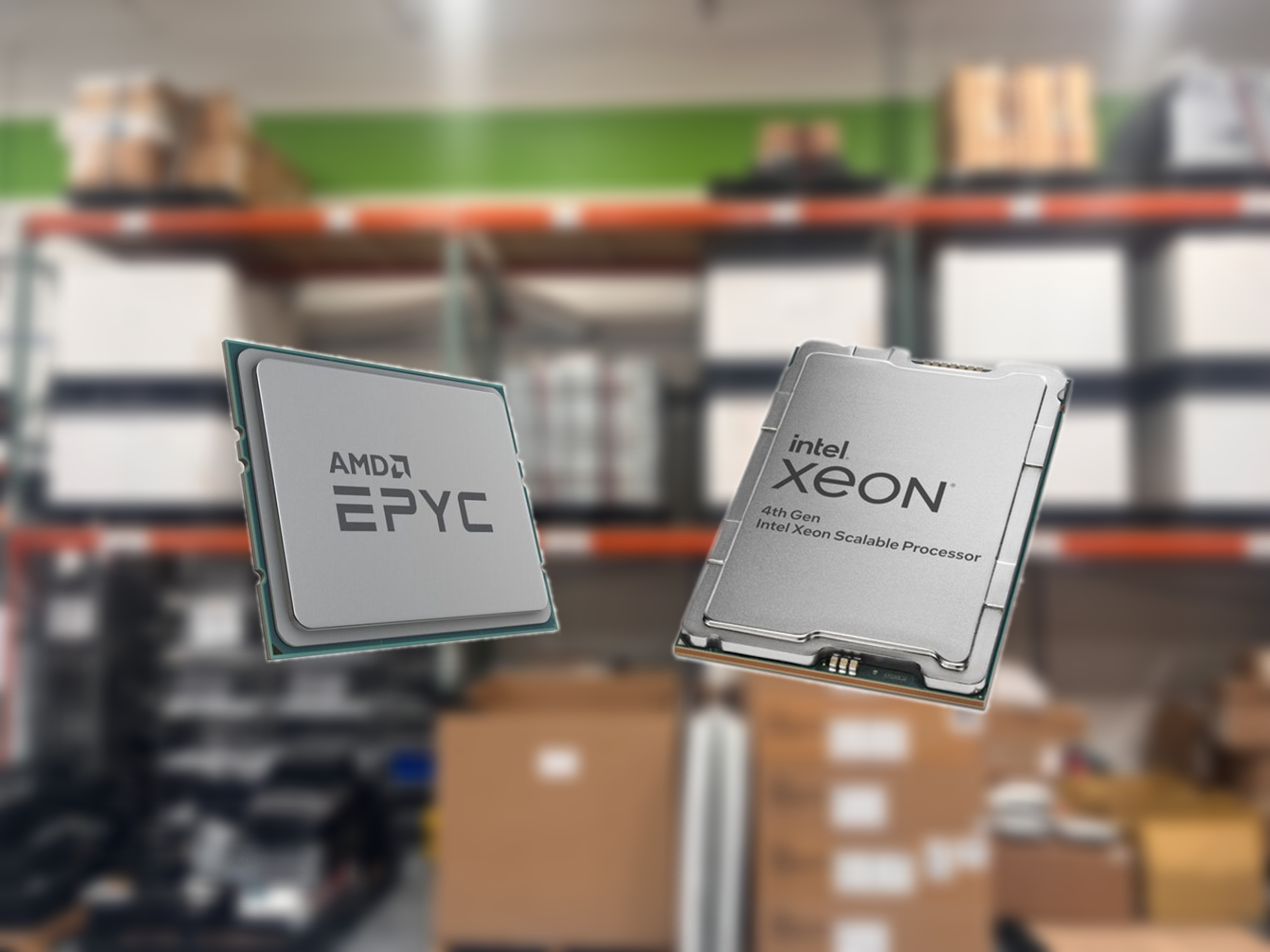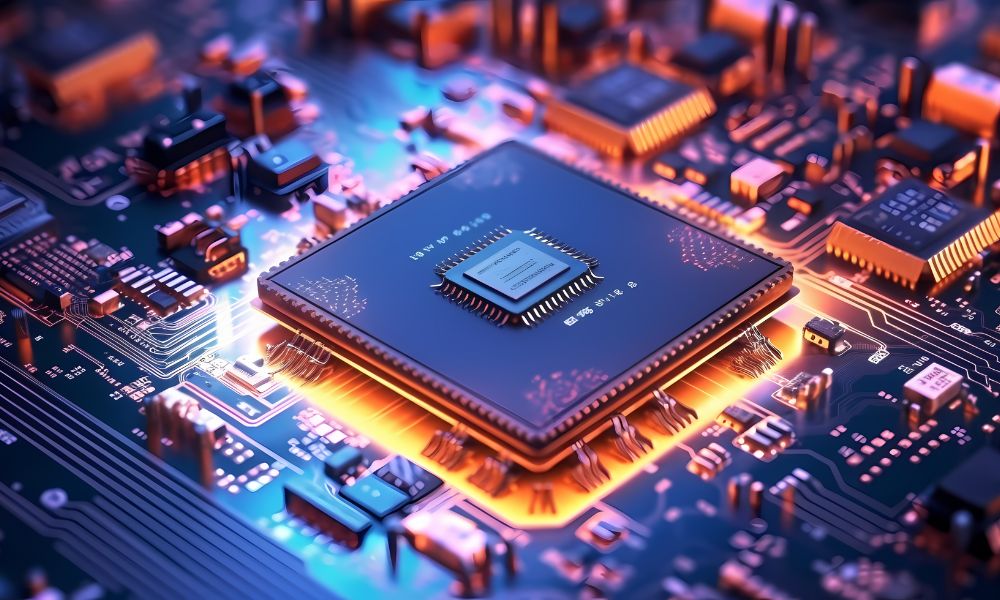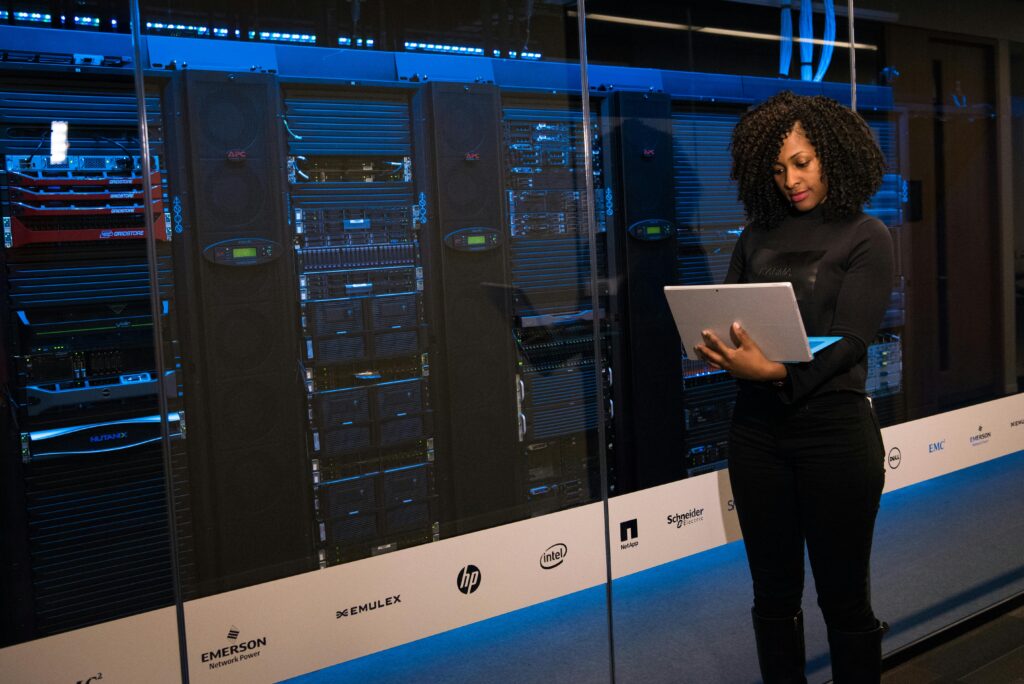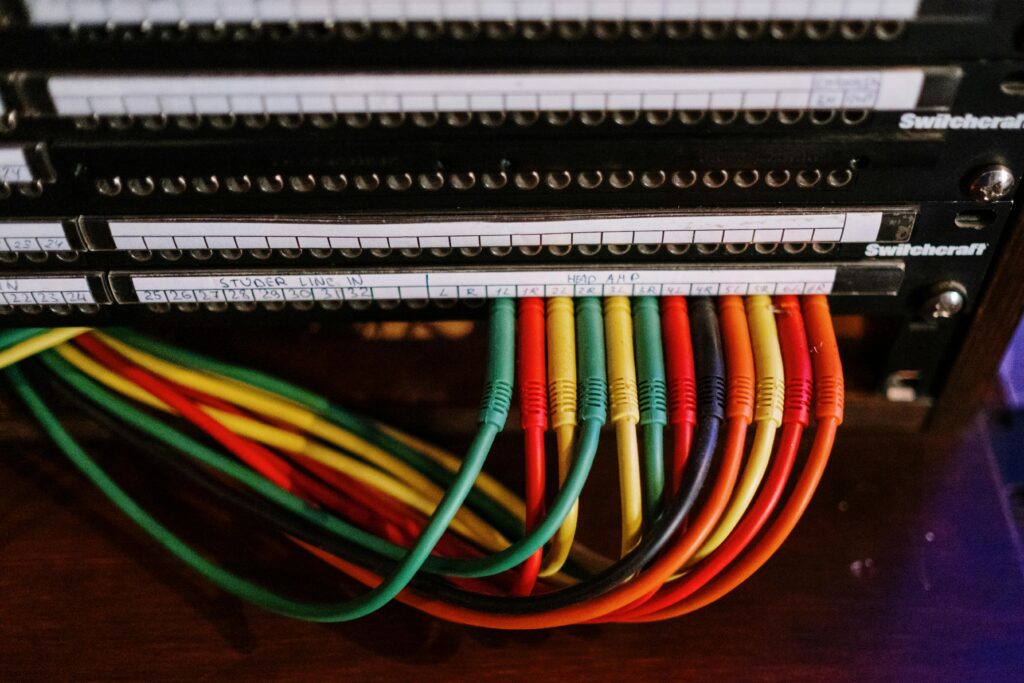For businesses looking to maximize their technology resources, making the right choice when selecting a processor is essential. In the server processor market, AMD EPYC and Intel Xeon stand as two industry-leading options, each offering unique advantages in terms of cost, expandability, and performance. However, recent developments in architecture, memory compatibility, and core counts make it essential to revisit these processors to understand their latest capabilities.
In this comparison, we explore AMD’s latest Zen 4 and Zen 5 architectures, now supporting up to 96 cores in the 9004 Series, and Intel’s Sapphire Rapids lineup.
We’ll examine improvements in multi-core processing, memory support, and the specialized features each processor line brings to modern data centers and enterprise workloads. From their foundational differences to the newest advancements, this guide will provide the insights you need to select the ideal processor for your organization’s evolving needs.
AMD EPYC vs. Intel Xeon: Technical Specifications
When evaluating AMD EPYC and Intel Xeon processors, it’s important to consider their technical specifications, security offerings, and overall support ecosystem. These factors impact not only current performance but also long-term compatibility and business scalability.
|
Feature |
AMD EPYC |
Intel Xeon |
|
Core Count |
Up to 96 cores (Zen 4, 9004 Series), with Zen 5 expected to increase core count further |
Up to 60 cores (Sapphire Rapids), optimized for scalable performance |
|
Architecture |
Zen 4 and Zen 5, focusing on multi-core performance and energy efficiency |
Sapphire Rapids, tailored for high-performance and AI workloads |
|
Memory Support |
DDR5 with six-channel memory for enhanced bandwidth and scalability |
DDR5 support with high bandwidth, suitable for data-intensive environments |
|
Energy Efficiency |
Designed for high energy efficiency, ideal for high-density server setups |
Advanced power management for balanced energy use in data centers |
|
AI and Upscaling |
Built-in AI capabilities with optimized instruction sets for machine learning applications |
AI acceleration, supporting deep learning and data-intensive processing tasks |
|
Target Applications |
Ideal for virtualization, cloud computing, data analytics, and high-performance servers |
Suited for AI, HPC, large-scale enterprise, and virtualized environments |
|
Security |
Secure Encrypted Virtualization (SEV) and Secure Memory Encryption (SME) |
Software Guard Extensions (SGX) and Total Memory Encryption (TME) for comprehensive security |
|
Ecosystem and Compatibility |
Expanding ecosystem with growing OEM partnerships and software vendor support |
Well-established ecosystem with extensive OEM and software vendor support |
|
Long-Term Support |
Increasingly enterprise-ready with regular updates and a growing support network |
Strong long-term support with dedicated enterprise services and consistent updates |
Workload-Specific Considerations
For workload-specific considerations in choosing between AMD EPYC and Intel Xeon, each processor has distinct strengths tailored to different demands.
AMD’s Zen 4 architecture in the EPYC 9004 Series makes it highly effective for dense virtualization and cloud computing. This high core count and memory bandwidth allow AMD EPYC to efficiently manage large-scale virtual machines, making it ideal for virtualization-heavy environments.
For data analytics and AI, AMD’s increased core count and memory bandwidth offer advantages in large-scale processing, while Intel Xeon’s efficiency in core handling can excel in balanced workloads where reliability is key. In web and application server use, both AMD and Intel processors perform well, with AMD EPYC’s scalability suiting high-traffic needs, and Intel Xeon’s extensive platform compatibility ensuring consistent performance across enterprise applications.
Scalability
Businesses across all industries need powerful, reliable technology that can keep up with their growing demands and give them room to expand if needed. AMD EPYC, with its Zen 4 architecture, supports up to 128 PCIe 5.0 lanes, DDR5 memory, and Infinity Fabric Link for high-speed data sharing, allowing for efficient scaling in multi-socket setups.
Intel’s latest Xeon Sapphire Rapids processors provide up to 60 cores, PCIe 5.0 lanes, and DDR5 memory, with Compute Express Link (CXL) and support for up to 8TB of memory, making them ideal for memory-intensive environments. Both processors provide robust scalability, with AMD focused on core and lane count, and Intel on memory capacity. Impressive numbers from both sides!
Security Features
AMD EPYC’s Infinity Guard suite provides advanced security features, including Secure Encrypted Virtualization (SEV) and Secure Memory Encryption (SME). SEV enables encrypted virtual machines, protecting data in multi-tenant environments, while SME offers additional protection against unauthorized memory access by encrypting data stored in memory.
In contrast, Intel Xeon processors include Software Guard Extensions (SGX) and Total Memory Encryption (TME), designed to secure data and code integrity. SGX provides isolated enclaves for protecting sensitive application data, while TME offers encryption for all memory, reducing exposure to attacks that attempt to access memory directly.
Each of these security features provides robust data protection, with AMD emphasizing encrypted virtualization and Intel focusing on memory and application-level security.
Processor Price
As we enter 2025, many people turn to AMD EPYC and Intel Xeon processors for their computing needs. But there’s a big question: which processor will provide the best performance without breaking the bank?
Both AMD EPYC and Intel Xeon processors offer competitive performance across various workloads. AMD’s 5th Gen EPYC 9005 Series processors, such as the 192-core EPYC 9965, are priced at approximately $14,813 USD. In comparison, Intel’s flagship Xeon processors, like the Platinum 8952+, are priced similarly, though specific figures may vary based on configurations and vendors.
When evaluating these processors, it’s essential to consider not only the initial purchase price but also the total cost of ownership (TCO). Factors such as energy efficiency, performance per watt, and system compatibility can significantly impact long-term expenses. For instance, AMD claims that their EPYC 9965 processor delivers up to 2.7 times the performance compared to Intel’s competing flagship, potentially offering better performance per dollar.
Compatibility
If you’re looking at leaping either AMD EPYC or Intel Xeon processors, compatibility is one of the most important factors to consider. How will they work with different operating systems like Windows or Linux? How about their compatibility with virtualization software and other hardware components?
With an AMD EPYC or Intel Xeon processor installed, users will want to check for potential compatibility issues to reap the full benefits. Intel’s Xeons are designed for heavy enterprise workloads, running on Linux- and Windows-based systems for maximum scalability with seamless switchover between applications. Meanwhile, AMD’s EPYC processors offer strong onboard security capabilities compatible with many outside security software packages.
So however you decide to go when choosing AMD EPYC vs. Intel Xeon processors, make sure you factor in compatibility before making your final decision.
Use Cases
With the ongoing battle between AMD EPYC and Intel Xeon processors, it’s essential to understand the differences in use cases. Depending on whether you’re in a data center, cloud computing environment, or engaging in heavy-duty processing for HPC applications, each option brings something different to the table.
For Media & Entertainment, AMD EPYC’s high core count handles rendering and transcoding tasks effectively, ideal for studios needing robust multi-threaded performance. Intel Xeon, with its high single-thread capability, is preferred for real-time feedback in workstations.
In Telecommunications & Networking, AMD CPUs scalability supports virtualized network functions and 5G infrastructure, while Intel Xeon excels with specialized accelerators like QuickAssist Technology, useful for data compression and encryption in network applications.
For Automotive applications, AMD EPYC’s parallel processing suits intensive simulations and ADAS development, while Intel Xeon’s AI acceleration aids in image recognition and analytics, crucial for autonomous driving.
In Financial Services, AMD EPYC enables rapid data processing for high-frequency trading and risk modeling. Intel Xeon, with strong encryption and low-latency performance, is optimal for secure, real-time trading platforms.
Retail & E-Commerce benefit from AMD EPYC’s data processing power for inventory and customer analytics. Intel Xeon’s compatibility with CRM and ERP applications provides balanced performance for managing customer and sales platforms.
Future Developments
As we move forward, both AMD and Intel have clear paths to further strengthen server performance and efficiency. AMD’s recently launched Zen 5 architecture in the EPYC 9005 Series delivers higher core counts, improved power efficiency, and enhanced AI processing. These improvements make Zen 5-based EPYC processors highly suitable for handling large-scale workloads across AI, data analytics, and cloud computing, where high multi-core performance is crucial.
Intel’s upcoming advancements with its next-generation Xeon processors focus on boosting single-thread performance, expanding AI acceleration, and integrating technologies like Compute Express Link (CXL) to enable more efficient resource sharing. These updates position Intel Xeon processors well for real-time processing, secure data handling, and enterprise applications that require high reliability and responsiveness.
Summary of Pros and Cons
AMD EPYC and Intel Xeon are high-performance processors used in data centers and similar environments. Let’s take a look at the pros and cons of each:
AMD EPYC Pros:
- More cores per socket than Intel Xeon
- Better memory bandwidth
- Lower power consumption
- More PCIe 5.0 lanes
AMD EPYC Cons:
- Lower single-core performance compared to Intel Xeon
- Some software may not be optimized for AMD processors
Intel Xeon Pros:
- Higher single-core performance
- Better virtualization support
- Strong brand reputation
- Broad software support
Intel Xeon Cons:
- Fewer cores per socket than AMD EPYC
- Higher power consumption
- Supports fewer PCIe lanes
Ultimately, the choice between AMD EPYC and Intel Xeon comes down to a trade-off between performance, power consumption, scalability, security, price, and compatibility. Here’s a summary of the trade-offs:
- AMD EPYC has more cores per socket, better memory bandwidth, lower power consumption, and more PCIe lanes, but it may have lower single-core performance, and some software may not be optimized for it.
- Intel Xeon has higher single-core performance, better virtualization support, a strong brand reputation, and broader software support. Still, it has fewer cores per socket, higher power consumption, and supports fewer PCIe lanes.
Choosing the Right Processor for Your Business
Performing a comprehensive comparison between AMD EPYC and Intel Xeon processors is essential to finding the processor that best suits your computing needs. Each option brings unique strengths, offering excellent performance and reliability for various applications. Whether you’re optimizing for high-core performance, efficiency, or compatibility, both AMD EPYC and Intel Xeon processors are solid investments for the long term.
If you’re looking to upgrade to one of these powerful processors or sell your old equipment, consider exIT Technologies for competitive pricing and fast delivery. We make it easy to maximize the value of your tech investments.







